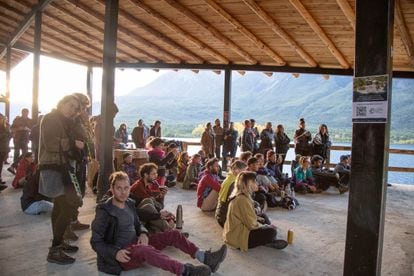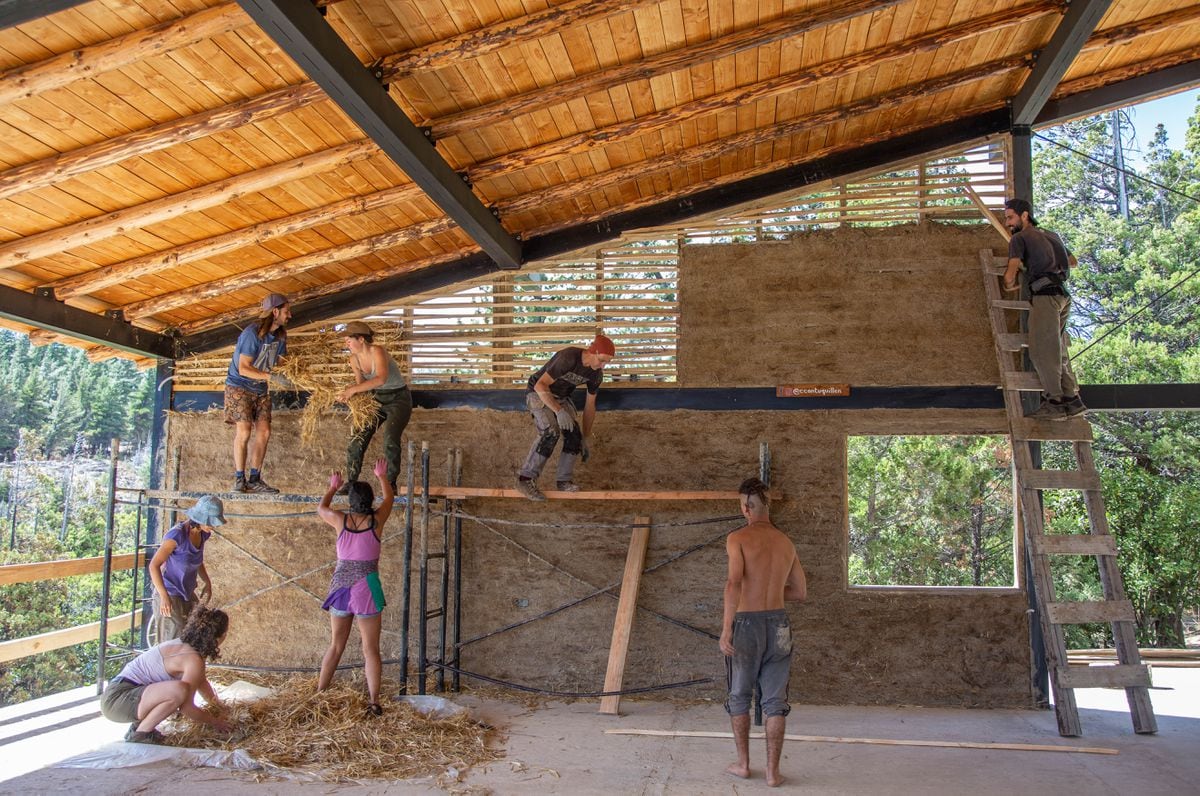EL PAÍS offers the América Futura section openly for its daily and global information contribution on sustainable development. If you want to support our journalism, subscribe here.
In the early 1980s, settlers from Patagonia and neighbors from southern Argentina joined together to stop the construction of a dam that would flood the territory and displace them. From Buenos Aires, 1,500 kilometers away, a radio listener heard about their resistance and planted an idea in them that would emerge some time later: “It would be important that, if they manage to win the fight, they choose the best place on the lake and in that place make a space dedicated to the original culture.” The group managed to prevent the mega-infrastructure from being built and two decades later, on an elevated area of land overlooking the blue lake, they founded a cultural center. The space, which they called Antu Quillen, operated in the town of Epuyén until a fire destroyed it in 2018. A group of partners from the cultural center have proposed to recover it through community work and bioconstruction.
Several guardians, wooden totems measuring more than two meters carved by local artists, protect the surroundings of the cultural center. The new building, which is supported by an iron structure and enclosed with mud walls and large windows, is almost finished. Recently, the partners installed a stained glass window that has a sun and a moon in the center—Antu Quillen, in the Mapuche language—and a large wooden bar, but the floors, an outdoor terrace and some finishes are still missing. Getting here has not been easy, say the partners participating in the reconstruction, but they are encouraged by a conviction: “A place dedicated to culture cannot be lost.”
The building is located within the Puerto Bonito municipal park, a protected forest of more than 30,000 hectares overlooking Lake Epuyén, in the Patagonian province of Chubut. There was a candy store that was abandoned until some of the original residents and neighbors who had resisted the construction of the dam asked the municipality for the facilities to create the Antu Quillen. The founders reached an agreement with local authorities in 2001 to operate a cultural center with three objectives: promote the cultural heritage of indigenous peoples; develop a sustainable economy and promote the protection and care of the environment. Today the association has a loan valid until 2032 with the possibility of extension.
After the fire, members of the civil association that coordinates the space immediately began to remove the rubble and rebuild part of the building. But, with the pandemic in the way, the work was stopped. Ernani Iuso, a resident of Epuyén and vice president of the commission that is currently working to recover the space, remembers seeing the works stopped and fearing for the future of the cultural center while interest in the building, which is municipal, “grew more and more.” “It is in a strategic point and is a very delicate place for the lake basin. If things are done wrong, the lake, the forest, the land will be contaminated… Therefore, it has to be taken care of,” says Iuso, who is 32 years old and is a musician.
The partners decided in an assembly to reconstruct a good part of the new building through bioconstruction, a way of building with materials and processes that generate a low environmental impact. 50% of the new Antu Quillen building was made with this method, according to the partners' calculations, with materials such as mud, straw or wood. “This is what some indigenous people did, who know about the matter. Many of us have also made our own houses like this or have helped friends do it… It is a cheap and very thermal option. When we organize ourselves, we can make a lot of progress,” explains Iuso.
To advance with the works, the members organize themselves in a self-managed way, with funds that come from donations, money that the association raises with events and contributions from more than 300 members, and with some municipal aid. This allows them to buy the materials and pay some wages. Furthermore, they organize mingas, volunteer work days in which neighbors, partners, even tourists who are passing through, participate. “It is something wonderful. It's work, but it's also something social. You are doing something that transcends you and from which you learn and receive a lot,” describes Carolina Cerati, who is a member of the cultural center and was the president of the association when the fire occurred.
“It is possible to do cooperative things”
That night in 2018, Cerati was woken up by a call. When she arrived at the cultural center building, which was on fire, there was little to do and someone told her at that very moment: “We are going to build it bigger and prettier.” “Your strength comes down from somewhere,” says Cerati, a 41-year-old lawyer, who continued running the cultural center for a while longer while she was raising a young daughter. Cerati believes that part of that strength is “ancestral”, that of the original inhabitants of the place, and another comes “from the generations before” his, who planted “a flag of conscience” when they arrived in Epuyén from the seventies attracted by a way of life in contact with nature.
The participation of indigenous peoples in the cultural center has been decreasing and today it is a challenge for the association to attract them to the space. The objectives of Antu Quillen remain the same as those expressed in its statute by the founders, although new “artistic and social manifestations” have also been added. The cultural center now operates partially, with some live concerts and the sale of local products. The partners hope that when it is enabled and fully operational there will be space for classes in Mapuzungún, the Mapuche language; ceramics, drawing, photography or painting workshops; theater plays; more concerts; conventions and a permanent arts and crafts hall, as well as an offer of local cuisine. But first they need to recover the building, and that's what they're doing.
Cerati acknowledges that they have had difficulties—negotiations with the municipality, internal differences…—but defends community organization “despite everything”: “It is not easy, but there are not many options left. Or there is another option, which is to privatize, everyone go home and take care of their things. But I think that the majority of people who are here and who participate in the cultural center believe in another reality, that it is possible to do cooperative things.” “It is important to preserve this place because if not, it will be another normal candy store and that's it, the story is over,” Cerati continues and adds: “It can be much more than that. These spaces are seeds that a better world is possible.”

#resurgence #Antu #Quillen #wood #mud #straw #collective #work #build #cultural #center #Patagonia

Leave a Reply